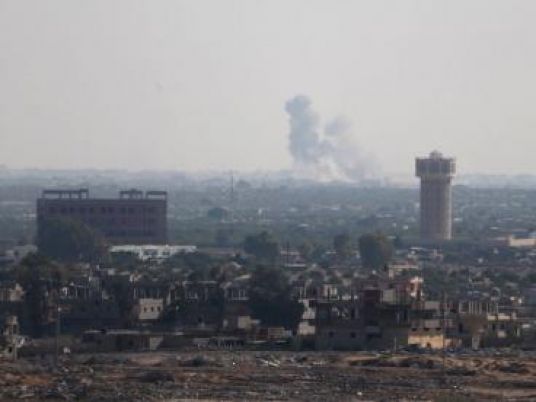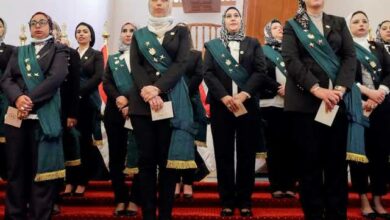Both state-owned and independent newspapers lead today with news that the State Council will continue to deny women the right to serve as judges.
The results came after four hours of “intense arguments,” which culminated with four of the six State Council members opposing a motion to open the judiciary to women, according to Al-Ahram. Despite the results, the head of the State Council, Mohamed Ahmed el-Hosseiny, maintained that progress on women’s rights rights has been achieved, as women are now eligible to apply for the position of Assistant Representative of the Council.
The state-owned paper reports that compensatory measures are being taken by el-Hosseiny himself, in the face of firm opposition from other members of the Council. With the issue far from settled, el-Hosseiny reportedly plans to re-propose the matter soon. The State Council had previously voted on the same issue on 18 January, 2010, with a result of three to three.
Rose el-Youssef focuses on the bright side of the story, declaring a "victory for women in the State Council" in its headlines. With its report only vaguely mentioning the voting process, the "victory" was attributed to measure taken by el-Hosseiny, who stated "the idea that women are unfit for judicial work is an insult to all," before comparing that belief to those held by the Taliban in Afghanistan.
State-owned papers also cover the 22nd annual conference of the Higher Council for Islamic Affairs, held yesterday in Cairo. According to Al-Gomhurriya, Prime Minister Ahmed Nazif delivered a speech written by President Mubarak, emphasizing the need for “enlightened religious dialogue” supported by “an educational system that encourages tolerance and acceptance of others.”
Addressing representatives from 80 countries, Nazif continued to speak on behalf of the president, calling on Egypt’s “scientists and intellectuals to double their efforts and concentrate on improving the image of Islam, which has suffered many wrongdoings.” The speech also mentioned the difficulties many Muslim Arabs face finding desirable jobs due to anti-Muslim discrimination abroad. “Religious fundamentalism is an obstacle to development in the Muslim world, and prevents many from many from making progress,” Nazif said, before pointing out “and in today’s world, there’s no place for the weak.”
Elsewhere, Al-Gomhurriya predicts the “capture of the synagogue bomber within a few hours” in an “exclusive” update at the bottom of its front page. According to what the paper has learned from a “reliable source,” security forces have picked up several “strings trailing back to the perpetrator, which will result in his downfall within the next few hours.” The source also revealed that security services are always fully aware of any threats against Egypt and its reputation, security and stability.
Al-Wafd also addresses the synagogue bombing in a story under the headline “Israel sticks its nose in our internal affairs.” The paper reports that on his first day as Israeli ambassador to Egypt Yitzhak Levanon has taken an “annoying stance” regarding the failed bombing by demanding that local authorities report the results of their investigations to him. Al-Wafd writes that in Levanon’s communications with the Israeli government, the ambassador “forgot” to point out the no one had been injured. The paper also berates Levanon for ignoring the fact that the temple in question is specifically designated for Egyptian members of the Jewish faith and, as such, does not fall under Israeli jurisdiction.
Al-Dostour dedicates a third of its front page to yesterday’s meeting between Mohamed ElBaradei and Amr Moussa, with the headline “Change is on the map” cleverly positioned over a map in the background of the accompanying photograph. In its report, Al-Dostour speculates that the 80-minute meeting was a “possible attempt at forming an undeclared political alliance between the two men, whose names have been repeatedly mentioned in regards to presidential candidacy.” By the meeting’s end, no official announcements were been made by either attendee, with ElBaradei remaining frustratingly tight-lipped and refusing to answer any questions.
Al-Shorouq also covers the meeting, adding to Al-Dostour’s report by quoting ElBaradei in a TV interview two days ago, during which the potential presidential candidate stated, “I will run for presidency if the people ask me to, even if my opponent is President Mubarak.”
Al-Shorouq also notes the results of a recent annual survey conducted by the Pew Research Center, determining the general opinion on several issues within Middle Eastern countries. According to Al-Shorouq, one of the survey’s key findings indicated a decrease in the popularity of both Hamas and Hizbullah, particularly in Palestine and Lebanon, respectively. Concerning Egyptians, results conclude that 52 percent still hold a positive opinion of Hamas, with a slightly lower figure for Hizbullah.
Egypt’s newspapers:
Al-Ahram: Daily, state-run, largest distribution in Egypt
Al-Akhbar: Daily, state-run, second to Al-Ahram in institutional size
Al-Gomhorriya: Daily, state-run
Rose el-Youssef: Daily, state-run, close to the National Democratic Party’s Policies Secretariat
Al-Dostour: Daily, privately owned
Al-Shorouq: Daily, privately owned
Al-Wafd: Daily, published by the liberal Wafd Party
Al-Arabi: Weekly, published by the Arab Nasserist party
Youm7: Weekly, privately owned
Sawt el-Umma: Weekly, privately owned




